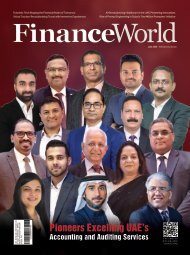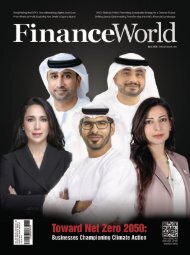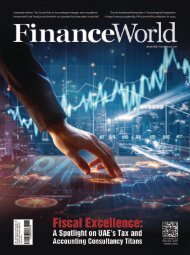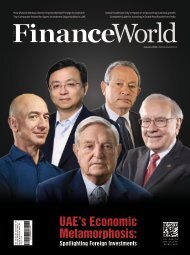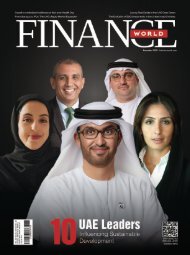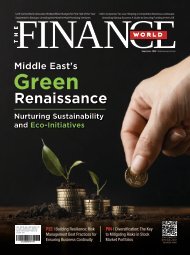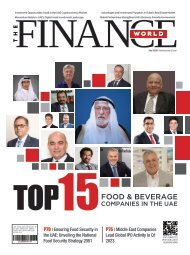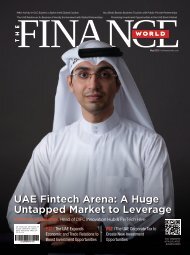The Finance World Magazine| Edition: April 2023
The April edition of The Finance World Magazine (TFW) delves into the world of disruptive investment and its potential to transform markets, featuring an exclusive interview with Hadif Abdullah Zamzam, Senior Associate – Value Creation, Disruptive Investments at Mubadala, who shares his insights on this topic. In addition, we feature interviews with prominent CEOs, including Nilay Ranjan Singh of State Bank India, DIFC, Raman Thiagarajan, CEO & Founder of Zenda, and Naveen Bharadwaj, Group CEO of Trescon. They provide valuable insights on various topics related to business and investments, particularly in the fintech area. Through this edition, we also bring you insights on topics like the UAE and Turkey CEPA agreement that sets the ground for novel business opportunities, cryptocurrency adoption in the UAE and how it is expected to disrupt trade and payment systems, buying and selling properties in Dubai and strategies to boost profitability, and many more articles that offer critical analysis and insights on current trends and issues in the business and investment domains. Keep yourself up to date with all financial sector news with our current news segments. Each person can find something unique from us. We believe our readers deserve real value from what we have to offer.
The April edition of The Finance World Magazine (TFW) delves into the world of disruptive investment and its potential to transform markets, featuring an exclusive interview with Hadif Abdullah Zamzam, Senior Associate – Value Creation, Disruptive Investments at Mubadala, who shares his insights on this topic.
In addition, we feature interviews with prominent CEOs, including Nilay Ranjan Singh of State Bank India, DIFC, Raman Thiagarajan, CEO & Founder of Zenda, and Naveen Bharadwaj, Group CEO of Trescon. They provide valuable insights on various topics related to business and investments, particularly in the fintech area.
Through this edition, we also bring you insights on topics like the UAE and Turkey CEPA agreement that sets the ground for novel business opportunities, cryptocurrency adoption in the UAE and how it is expected to disrupt trade and payment systems, buying and selling properties in Dubai and strategies to boost profitability, and many more articles that offer critical analysis and insights on current trends and issues in the business and investment domains.
Keep yourself up to date with all financial sector news with our current news segments. Each person can find something unique from us. We believe our readers deserve real value from what we have to offer.
You also want an ePaper? Increase the reach of your titles
YUMPU automatically turns print PDFs into web optimized ePapers that Google loves.
Cryptocurrency can potentially<br />
revolutionize e-commerce in the UAE by<br />
offering a secure and efficient payment<br />
method that can be used globally.<br />
the UAE has the potential to disrupt<br />
trade and payment systems in several<br />
ways, some of which are the following<br />
scenarios:<br />
International Trade: Cryptocurrency<br />
can potentially simplify international<br />
trade transactions by eliminating the<br />
need for intermediaries such as banks<br />
and currency exchanges. This can<br />
reduce transaction costs and speed up<br />
the settlement process. Additionally,<br />
cryptocurrency can help to mitigate<br />
the risks associated with cross-border<br />
payments such as currency fluctuations,<br />
geopolitical risks, and fraud.<br />
Remittances: <strong>The</strong> UAE has a large<br />
population of expatriate workers who<br />
frequently send money back to their<br />
home countries. Cryptocurrency can<br />
provide a cheaper and faster alternative<br />
to traditional remittance channels, which<br />
are often costly and slow. This can be<br />
particularly advantageous for low-income<br />
workers who depend on remittances as<br />
a significant source of income.<br />
E-commerce: Cryptocurrency can<br />
potentially revolutionize e-commerce in<br />
the UAE by offering a secure and efficient<br />
payment method that can be used globally.<br />
This can enable businesses to expand<br />
their reach and access new markets<br />
without dealing with the complexities<br />
of traditional payment systems.<br />
Financial Inclusion: Cryptocurrency<br />
can provide an alternative means of<br />
payment for individuals and businesses<br />
who are not served by traditional financial<br />
institutions. This can help to promote<br />
financial inclusion and enable people<br />
to participate in the economy.<br />
However, the cryptocurrency scene<br />
in the UAE has witnessed some changes<br />
recently, one of which is what happened<br />
with FTX and Kraken, two of the world’s<br />
biggest cryptocurrency exchanges; FTX<br />
became embroiled in an international<br />
scandal and declared bankruptcy before<br />
it could establish a presence in the area<br />
last fall, while Kraken revealed this month<br />
that it would halt its AED services.<br />
Since Abu Dhabi and Dubai have high<br />
ambitions to make the UAE a global crypto<br />
hub, how can the latest changes affect the<br />
overall cryptocurrency landscape in the<br />
country? Jehanzeb Awan, Chairman of<br />
the Crypto and Blockchain Association,<br />
Middle East, Africa & Asia (MEAACBA),<br />
said that “<strong>The</strong>re will always be change<br />
in crypto blockchain because it is a new<br />
and developing sector; however, it is<br />
very important not to focus on cryptoexchanges,”<br />
because they are “just a<br />
small part of the overall ecosystem.”<br />
Awan also stressed that the UAE is a hub<br />
of innovation for the crypto-blockchain<br />
ecosystem, covering everything from<br />
regulation and education to assistance,<br />
which helps to “stimulate the sector<br />
across the region.”<br />
In that sense, the departure of FTX and<br />
Kraken may create a larger opportunity<br />
for those that have stayed, with Binance<br />
being the most apparent example. Binance<br />
acquired its initial license in Dubai in<br />
March 2022 and obtained its Financial<br />
Services Permission from Abu Dhabi in<br />
November.<br />
H. E. Thani Al Zeyoudi, UAE Minister<br />
of State for Foreign Trade, talked about<br />
cryptocurrency during an interview with<br />
Bloomberg in Davos, Switzerland. He<br />
stressed that “Crypto will play a major<br />
role for UAE trade going forward,”<br />
and he emphasized that the country is<br />
“attracting some of the companies,” with<br />
aim of building “the right governance<br />
and legal system.”<br />
From his side, H. E. Omar Sultan Al<br />
Olama, UAE Minister of State for Artificial<br />
Intelligence, Digital Economy, and Remote<br />
Work Applications, reemphasized that<br />
“<strong>The</strong> UAE has not issued a single licensed<br />
crypto exchange in UAE, neither Binance<br />
nor FTX.” <strong>The</strong> Dubai Virtual Assets<br />
Regulatory Authority (VARA) is responsible<br />
for licensing and regulating the crypto<br />
<strong>April</strong> <strong>2023</strong> www.thefinanceworld.com 55




